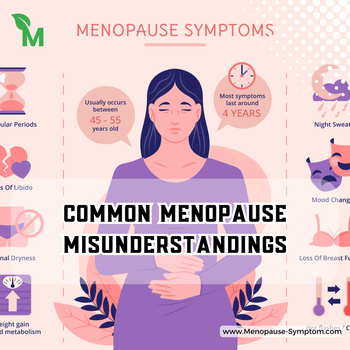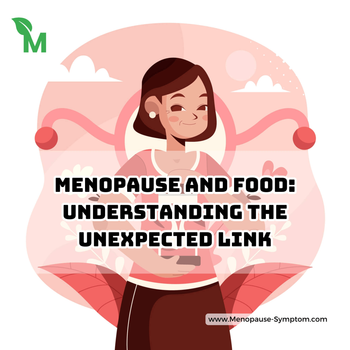Menopause is a natural phase in a woman's life, but it can bring about some surprising and sometimes alarming symptoms. In this blog post, we'll explore five shocking symptoms of menopause at 50 that you simply can't afford to ignore. Whether you're a longtime user of hormone replacement therapy or an expert in women's health, this information is crucial for navigating this new chapter in your life.
The Menopause Mystery: What's Really Happening?
Before we dive into the symptoms, let's briefly discuss what menopause actually is. Menopause is the natural biological process that marks the end of a woman's reproductive years. It typically occurs between the ages of 45 and 55, with the average age being 51. During this time, your body undergoes significant hormonal changes, particularly a decrease in estrogen and progesterone production.
These hormonal shifts can lead to a wide array of symptoms, some of which may catch you off guard. Let's explore the five most shocking symptoms of menopause at 50 that you need to be aware of.
1. The Midnight Inferno: Night Sweats and Hot Flashes
The Unexpected Heatwave
Picture this: You're peacefully asleep when suddenly you wake up drenched in sweat, feeling like you're trapped in a sauna. This, my friends, is one of the most common and shocking symptoms of menopause at 50 - night sweats and hot flashes.
Hot flashes can strike at any time of the day, but night sweats are particularly disruptive. They can leave you feeling exhausted, irritable, and downright uncomfortable. Many women describe the sensation as an intense, sudden heat that spreads throughout the body, often accompanied by a rapid heartbeat and flushing of the skin.
"I never thought I'd be waking up in the middle of the night, throwing off my covers and cranking up the AC in the dead of winter!" - Sarah, 52
Why It Happens and What You Can Do
The exact cause of hot flashes and night sweats isn't fully understood, but it's believed to be related to the hormonal changes affecting the body's temperature regulation. While you can't completely prevent them, there are ways to manage these symptoms:
Dress in layers so you can easily adjust your clothing
Keep a fan by your bedside
Use moisture-wicking bedsheets and pajamas
Practice relaxation techniques like deep breathing or meditation
Consider hormone replacement therapy after consulting with your doctor
2. The Emotional Rollercoaster: Mood Swings and Irritability
From Tears to Tantrums
One moment you're laughing at a silly cat video, the next you're sobbing uncontrollably over a minor inconvenience. Sound familiar? Mood swings and irritability are often overlooked symptoms of menopause at 50, but they can be some of the most challenging to deal with.
These emotional fluctuations can strain relationships, impact work performance, and leave you feeling out of control. It's important to recognize that these mood changes are a real and valid symptom of menopause, not just "being emotional" or "overreacting."
Balancing Act: Managing Your Moods
While it may feel like you're on an emotional rollercoaster, there are ways to smooth out the ride:
Practice self-care and stress-reduction techniques
Engage in regular exercise to boost mood-enhancing endorphins
Consider cognitive behavioral therapy or counseling
Explore natural supplements like St. John's Wort (but always consult your doctor first)
Communicate openly with your loved ones about what you're experiencing
3. The Vanishing Act: Vaginal Dryness and Discomfort
The Uncomfortable Truth
Let's talk about something that many women find embarrassing but is a crucial symptom of menopause at 50: vaginal dryness and discomfort. As estrogen levels decline, the vaginal tissues can become thinner, less elastic, and produce less natural lubrication. This can lead to:
Painful intercourse
Increased risk of urinary tract infections
General discomfort and itching
Decreased libido
It's essential to address this symptom, as it can significantly impact your quality of life and intimate relationships.
Reclaiming Your Comfort
Don't suffer in silence! There are several ways to manage vaginal dryness and discomfort:
Use over-the-counter vaginal moisturizers and lubricants
Consider prescription estrogen creams or rings
Practice pelvic floor exercises to improve blood flow to the area
Communicate openly with your partner about your needs
Stay sexually active, as this can help maintain vaginal health
4. The Foggy Brain: Cognitive Changes and Memory Issues
When Your Mind Plays Tricks
Have you ever walked into a room and completely forgotten why you're there? Or struggled to recall the name of a longtime friend? Cognitive changes and memory issues are often surprising symptoms of menopause at 50 that can be quite alarming.
Many women report experiencing:
Difficulty concentrating
Forgetfulness
Trouble finding the right words
Decreased mental sharpness
These changes can be frustrating and even scary, but it's important to remember that they're often temporary and manageable.
Clearing the Fog
While you can't completely prevent cognitive changes during menopause, you can take steps to keep your mind sharp:
Engage in regular mental exercises like puzzles or learning a new skill
Stay physically active to boost brain health
Ensure you're getting enough sleep
Consider memory-boosting supplements like omega-3 fatty acids
Practice mindfulness and stress-reduction techniques
5. The Incredible Shrinking Bones: Osteoporosis Risk
The Silent Threat
Last but certainly not least, we need to talk about a symptom of menopause at 50 that you quite literally can't see: increased risk of osteoporosis. As estrogen levels decline, your bones can lose density at an alarming rate, making them more fragile and prone to fractures.
This symptom is particularly shocking because it often goes unnoticed until a fracture occurs. That's why it's crucial to be proactive about your bone health during and after menopause.
Building Strong Bones
Here's how you can protect your bones and reduce your risk of osteoporosis:
Increase your calcium and vitamin D intake through diet and supplements
Engage in weight-bearing exercises like walking, jogging, or dancing
Quit smoking and limit alcohol consumption
Consider bone density scans to monitor your bone health
Discuss medication options with your doctor if you're at high risk
Embracing the Change: Your Menopause Journey
Navigating the symptoms of menopause at 50 can be challenging, but remember, you're not alone. Millions of women around the world are experiencing the same changes, and there's a wealth of support and resources available.
By staying informed about these shocking symptoms and taking proactive steps to manage them, you can navigate this new chapter of your life with confidence and grace. Remember, menopause is not just an ending - it's also a beginning. It's an opportunity to prioritize your health, explore new passions, and embrace the wisdom that comes with age.
Don't let these symptoms control your life. Take charge of your menopause journey, seek support when you need it, and remember that you have the power to thrive during this transition. After all, the best is yet to come!
Source: Team MPS compiled, analyzed and wrote. Please dont reup without source. Many thanks.

Menopause And Mindfulness: Finding Inner Peace
09.02.2024
Menopause is a natural transition in a woman’s life, usually occurring between the ages of 45 and 55. It brings with it many physical and psychological changes that can leave many feeling confused and anxious.

Managing Menopause: The Best Solutions
Invalid Date

Common Menopause Mistakes To Avoid
Invalid Date

Common Menopause Misunderstandings
Invalid Date

Menopause And Marriage: Are You Struggling?
Invalid Date

Menopause And Food: Understanding The Unexpected Link
Invalid Date
